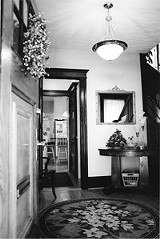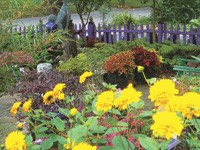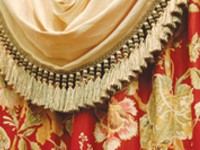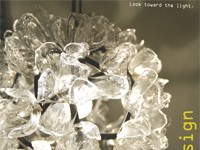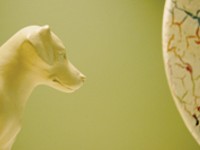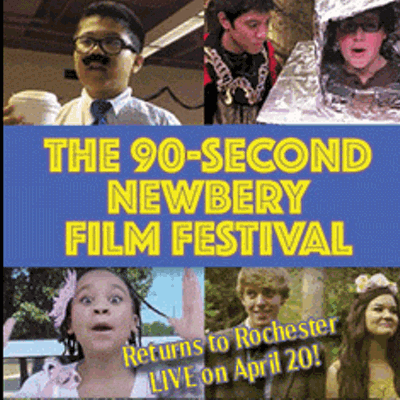[
{
"name": "500x250 Ad",
"insertPoint": "5",
"component": "15667920",
"parentWrapperClass": "",
"requiredCountToDisplay": "1"
}
]
You can find hundreds of books on feng shui at the bookstore: Essential Feng Shui, 101 Feng Shui Tips For Your Home, Feng Shui for Singles, Feng Shui for Dummies. There are feng shui candle sets, CDs, and body lotion.
Westerners have been trying to tap into the exotic wisdom of the "Orient" since we first discovered spices. Feng shui, an ancient Chinese practice of balancing the home environment to achieve positive energy flow, has hit the West with a boom. It fits into the new aesthetic of simplicity; it is a part of a quest for calm in lives that are increasingly stressed out.
Louisa Ong-Lee, who studied feng shui in her native Singapore before moving to Rochester, laughs a little at the "extras" often tacked on to modern, or new-age, feng shui: color therapy, aromatherapy, candles. To her, feng shui is a lot more elemental than those.
"Your home nourishes you, your home protects you, your home rejuvenates you," she says. "There is no other place in this whole world where you can sit, and be happy, and be protected, except in your home. You can say, 'I go to work,' but that is not your place. The energy, the goodness of the land, will nourish you."
The art of feng shui originated in ancient China, when people were looking for a way to properly bury the dead. Laying someone to rest in the right place and in the right soil was thought to benefit that person's descendents.
"Then it was so powerful they said, 'Hey, we can use this for the living, too,'" Ong-Lee says. Ideas and philosophies used in feng shui are written in the I Ching, or the Book of Changes, one of the world's oldest texts. The book describes different arts of divination and of balancing the world's opposites --- yin and yang --- and it has influenced the development of Taoism, feng shui, and fortunetelling (part of which is determining if couples are compatible, or the most fortuitous dates to get married or start a new job).
Ong-Lee studied the I Ching with a feng shui master --- in a traditional master-apprentice relationship --- almost every day for six years. She went along with him on countless visits to homes and offices when he would practice feng shui and she would watch and listen. At the end of her training, she took several oaths.
"One of them was that I had to practice responsible feng shui," she says. "The other one is that I must never let the art die, I have to choose my disciples carefully and I must pass this treasure on. And another one is, wherever I newly reside I have to give 10 free consultations."
The object of feng shui is to give back to the environment and the community. By giving free consultations, Ong-Lee fulfilled part of her obligation to her master to spread the good word.
Practicing responsible feng shui sometimes means telling people things they don't want to hear. "Sometimes a house is so bad and doesn't fit the occupants," Ong-Lee says. "I will just tell them the truth and tell them, 'It's better for you to move.' And I have done that. It's a very hard thing to do."
Ong-Lee herself moved out of a home at the advice of a feng shui advisor. She was living in Singapore, and had moved into a new home with her husband and daughter, and her son was on the way. Though her parents were traditional and consulted with a feng shui master before every New Year and talked to fortunetellers before big occasions, Ong-Lee had rejected the practice. "I wanted to be modern," she says. "And feng shui was an old, ancient art."
But in her home, things were going wrong. Her husband had a strange accident, her daughter became sick, and her pregnancy was difficult. She called in a feng shui advisor, the man who would later become her teacher. He told her to move out of her house, and that night she packed her bags. The experience brought her back to the practice of feng shui. And with training she came to understand what the practice really is.
"I am not an interior decorator," she says. "I am not a ghost buster." Neither is feng shui a religion. (Ong-Lee is Catholic.)
She says it is a philosophy and a way of living. The proper practice of feng shui, Ong-Lee says, will benefit three generations of your descendents. But it is not an easy fix.
"In life, do you always have good?" she says. "We will always have challenges, we will always have obstacles, we will always have troubles. But what feng shui does, it smoothens your journey so that you can enjoy the essence of living."
Pat Obstarczyk had Ong-Lee visit her house two months ago. She called in a feng shui advisor out of curiosity. "I've had houses where I had really good energy," she says, "and I never really thought twice about it. But the house before this one, those were the worst three years of my life. Even when I bought the house I never felt comfortable in it."
Obstarczyk saw Ong-Lee speak at an event, and afterwards had her lucky number and her best direction calculated. "I noticed west was not on it, and my other house faced west."
Before she had the consultation, she talked to Ong-Lee about her new office, which would also be facing west. Ong-Lee gave her some countermeasures to implement, and they seemed to help. So, next was the house visit.
Obstarczyk hasn't implemented all the recommendations for her house yet. She needs to get a representation of a dragon for the kitchen, she is supposed to have fresh flowers by the door, and Ong-Lee wants her to get rid of a fan over her bed. But without air conditioning in the house, she's not planning on it.
"It's the one thing in the whole house she was pretty adamant about," Obstarczyk says, "we're still negotiating that."
Though she isn't always sure why Ong-Lee recommended what she did, the experience gave Obstarczyk some awareness of her surroundings, how they affect her, and vice versa. Feng shui prescribes that there are good places for her to sit in the house and if she's not feeling well, she should face south. She has learned something about why she might have felt such bad energy in her previous house.
"Your energy changes in the house," she says, "people move in, people move out, you change things around, you buy new things and bring them into the house. Feng shui is something that needs to be done periodically, so you keep the energy flowing positively."
When Ong-Lee visits a home, she brings her lo-pan, a compass set inside a brass disc. On the disc is information --- Chinese characters and numbers --- that corresponds to different compass points.
"It is very hard to explain to you," she says. "It's energized with my energy. When you bring in an energized lo-pan into a house, it wakes up the dormant energy. People can feel it."
She takes the direction of a house, including which way it faces, where the door is facing, and other measurements. She takes down the date the house was built, the date of any renovations, and the birth dates of all the people living there. She calculates all of those dates to determine the house's correct age, using a formula that her teacher passed on to her.
Factoring in the age and direction measurements she took, she balances the elements --- fire, earth, metal, water, and wood --- in the home, using formulas she has learned. Then she factors in the elements of the people living in the house. Every person has an element.
"Then I look at the whole picture to make sure that with whatever I've done, the house is still balanced," she says. "Because if you put in too much of one thing, it can be very destructive."
The practice is specific to each space, and depends on the people who live or work there.
"People write about feng shui but they make it very basic," she says. "Like they say, 'You go into a home, to the west is children, to the north is your wealth, the south is your family,' that sort of thing. But no home is the same. Even if it is the same design... it's different. Because it sits on a different piece of land, the energy from the land is different. Then the surrounding structures, other houses --- it's different. The people who live there, they're not the same."
After she has made her plan for balancing a home, Ong-Lee helps people implement it. And she works with each person's style and lifestyle to make it feel seamless.
"I incorporate feng shui into Western homes without people coming in and saying 'Oh my goodness, there's something wrong with the décor,'" she says. A wealth toad, for example, a Chinese symbol that many people associate with feng shui, can be hidden behind a potted plant. Coins placed over the door can ward off an arrow-like structure, like a tree, that is poking at the door (which can bring sickness). If someone needs more water, which brings wealth, a picture of water or a fountain can help. A handful of coins adds metal, a picture of a forest adds wood.
She also looks at specific sectors and tries to boost areas that bring good fortune, health, or relationships, depending on what the residents need. She says there are four good sectors (spots you naturally gravitate towards) and four bad sectors (spots where you never feel comfortable) in every home.
Maria Ciaccia, a massage therapist, called Ong-Lee because, she says, "I desperately was seeking changes in my life." Ciaccia was looking for a boost in her career and in her love life. "I was always into feng shui," she says, "and I thought I knew something about it. Come to find out, I knew nothing. I never knew there was actually a pure form, which is what she practices."
Ong-Lee suggested changes like placing water or metal in certain corners, a wealth toad that should face out the door during the day and face inside at night, and changing colors and removing mirrors from the bedroom (the room Ciaccia always felt least comfortable in and the room that needed the most work). The results were more than Ciaccia hoped for.
"It absolutely worked. My life changed dramatically," she says. "She's the real deal." Just after Ciaccia implemented most of the changes, her message therapy business started thriving, she got a job at Kodak, and she started dating someone.
"It's not a religion or anything funky or weird, it's a way of life," she says. "It wasn't like you had to knock out walls, it's just placing things in certain places. This is going to be an annual thing for me."
Ong-Lee tells one story about a woman in a bad marriage. The woman wanted a divorce but her husband threatened to sue for custody of their child. The woman called Ong-Lee, and asked her to do something to her house so he would get sick, or worse. But Ong-Lee was taught that feng shui is about doing good, for people and the environment. Her teacher had said he would never teach anyone who would do harm.
So Ong-Lee balanced the house in her own way. She boosted the husband's relationship sector, making him more attractive to women. Within months he had fallen in love with someone else, and told his wife he was leaving her and the child. The woman called Ong-Lee overjoyed.
"That way, nobody got hurt," Ong-Lee says.
For more information about feng shui, visit the American Feng Shui Institute at www.amfengshui.com. You can reach Louisa Ong-Lee at [email protected], 752-7862.
In This Guide...
Latest in Home Design
More by Erica Curtis
-
What's in the water?
Jun 14, 2006 -

Roses are red
May 3, 2006 -
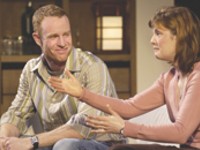
A family in circles
Mar 22, 2006 - More »
